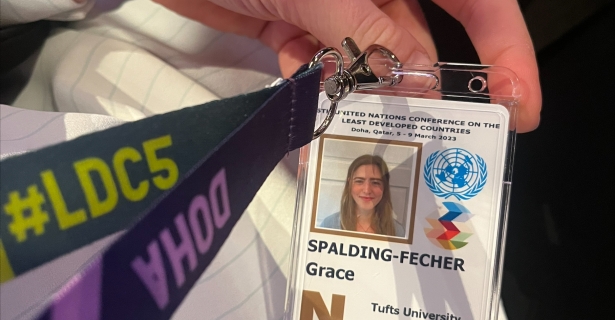As I sit at Hamad International airport waiting for my flight back to Boston, I reflect back on our time in Doha, Qatar for the 5th UN conference for the Least Developed Countries.
After three fully packed conference days my head is filled with everything that I learned and all of the conversations that I had with panelists, NGO leaders, observers and the other members of the Tufts delegation.
From the moment I stepped off the plane on Sunday morning to head straight to the conference, I was thrown into an exciting new world of panels, debates and meetings. We went to talks covering a range of issues addressed under the Sustainable Development Goals, which were organized under the tracks of Civil Society, Youth, South-South Cooperation and the Private Sector.
From "Leveraging the Power of Science, Technology & Innovation for the Sustainable Development of LDCs", "Transforming Education in LDCs: ensuring a focus on inclusion and gender equality” to "Sustainable Tourism", we heard from a range of UN agencies, heads of state, NGO leaders and policymakers.
One of my favorite sessions, called "Informality, Care and Migration", discussed the need to formalize unpaid care labor and highlight that decent work and economic growth go hand in hand. Paul Akiumi the director of UNCTAD's division on Africa noted that 75% of unpaid work globally is done by women, which means that women face a double burden of working in the formal sector to provide for their families while providing unpaid care labor, which means that their negotiating power is undermined.
Vicky Kanyoka, a coordinator for the International Domestic Workers Federation, argued that we need to move from corporate social responsibility to corporate social accountability to address this informality, where basic protections like minimum wages are protected by the law. They also discussed how migration is fundamentally tied to labor markets, with migrants making positive contributions to economic growth by filling labor gaps in key industries. This migration is not unidirectional, in fact in 2017, nine million people migrated into Africa filling skill gaps.
When we weren’t running from panel to panel, we tried to explore the vibrant city of Doha. From the bustling souqs filled with the smell of spices, oud, and wonderful sweet treats like baklava and knafeh, to the Corniche, a long promenade along the water we welcomed the bright sunshine after the grey cold of New England.
We visited a number of museums, including the National Museum of Qatar, whose unique architecture mimics the structure of a desert rose crystal. The museum documents the history of Qatar from the formation of the Peninsula up until today. As I head back to the US, I look forward to the opportunity to engage in meaningful conversations about our time at the conference and reflect on how an event like this can advance efforts to achieve the SDGs and whose voices are included in that process.

